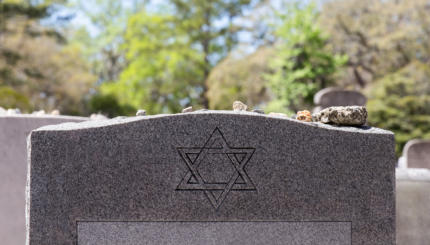There’s no shortage of Jewish rituals when it comes to death. From pre-burial practices to the custom of lighting memorial candles even decades on, Jewish tradition offers plenty of direction when it comes to death and mourning.
But when it comes to planning for one own’s death, Jews are often as unprepared as anybody, leaving loved ones to sort out the mess even as they grapple with their own grief.
It shouldn’t be that way, and it doesn’t have to. Here are seven things to think about and get in order before you die.
1. Buy a burial plot
This sounds elementary, but many fail to do it, forcing family members to scramble at the worst possible time. Some Jews buy a plot through their synagogue or make arrangements with a cemetery directly. For the indigent, the Hebrew Free Burial Association offers help with burial. Generations ago, Jews of Eastern European ancestry often belonged to the burial associations of their former hometowns’ fraternal associations, called . Some contemporary Jews still own plots handed down from these mostly defunct organizations.

Help us keep Jewish knowledge accessible to millions of people around the world.
Your donation to My Jewish Learning fuels endless journeys of Jewish discovery. With your help, My Jewish Learning can continue to provide nonstop opportunities for learning, connection and growth.
2. Make sure to have an up-to-date will
If your first spouse died and you’ve remarried, do you have your current spouse’s name on the documents? Are all your children listed — or, at least, all the ones who you want to be listed? Is everything in order, legally and otherwise?
Failure to pay attention to detail can be disastrous. After a man I know died recently, his daughter found his will, last updated in 1965, and called the witness listed to affirm its authenticity. That witness was her mother’s ex-best friend – whose husband, unbeknownst to the daughter, had an affair with the mother in the 1960s. The episode dredged up feelings that would have been better left buried.
3. Designate a power of attorney
A will is just the beginning of estate planning. You should also designate someone to exercise your power of attorney should you become incapacitated. Many families set up trusts to shield income for the care and support of elderly or special-needs family members. In cases in which someone is suffering from Alzheimer’s disease or another form of dementia, a guardian may be appointed to manage dicey situations. Anne Moses, an Alabama elder lawyer, recalls one case in which a man with dementia impulsively married the lady down the hall in his nursing home. The guardian quickly sent the bride a letter informing her that she should not expect any financial support. She filed for divorce three weeks later. You can find an attorney and other useful resources on the website of the National Academy of Elder Lawyers.
4. Decide what you want to do about end-of-life care
Put it in writing and talk to your loved ones about it. Do you want a Do Not Resuscitate order? To be intubated? Do you want to stay at home even if you’re totally incapacitated, or would you rather go to a facility so your loved ones don’t have the primary responsibility for your care? You can make your wishes known by writing out a health-care directive and appointing someone as your proxy to carry out those wishes.
Many synagogues and Jewish community centers have created programs, such as “What Matters: Caring Conversations at the End of Life,” to help people discuss their wishes with loved ones. Advance directives, living wills, and proxy forms can be drawn up by a lawyer or created via online forms or services such as legalzoom.com.
5. Give away, sell or trash your extraneous possessions
A lifetime of accumulating can leave a huge burden for your children to clear out once you’re gone. Now’s the time to clean house. Is your house filled with tchotchkes? Obsolescent gadgets, bills and correspondence from the 1980s? Toys, baby sweaters and art projects of beloved children now deep into middle age? Books, books and more books?
An over-abundance of things can degrade home values, so much so that an entire industry (think 1-800-JUNK) has sprung up to relieve people of the burden of cleaning out houses. Don’t leave your children with that burden. Clean house now.
6. Set up a process to give your loved ones access to your papers, accounts and passwords
If you don’t want them to have access now, put a plan in place for informing your kids or spouse about all your bank accounts, assets, life-insurance policies and anything else they might need. Share your passwords, including to your email and other accounts.
Adam Schoenfarber, social work team manager with MJHS Health System, advises older people to plan for the disposal of their digital presence by leaving instructions in the cloud and in hard copy.
“If you die or are unable to manage your digital profile, who gets control of those resources?” Schoenfarber said.
There are also the issues of how visible and public you want to be about your illness and how you would like people notified about your death. Some families will maintain your Facebook page as a memorial; others will opt for privacy. By leaving instructions, you can eliminate an unnecessary source of tension.
7. Talk to your loved ones about your funeral
There are many details to consider, both logistical and religious. Which traditional Jewish burial customs are important to you? Do you want your loved ones to ensure that you have a ritual cleansing known as tahara? And what do you want to wear for eternity? Traditionally, Jews are buried in a simple shroud, but some may wish to eschew this plain white garb for a dress or suit. Are there specific people you want to deliver eulogies? If it’s important to you that your loved ones sit for you for all seven days, let them know. Many Jewish funeral homes offer pre-planning services so you can make these arrangements in advance.
Whatever you decide, whether it’s about your funeral or your earthly possessions, don’t forget to communicate your preferences to your loved ones. Then you can rest in peace.
Sign up for a Journey Through Grief & Mourning: Whether you have lost a loved one recently or just want to learn the basics of Jewish mourning rituals, this 8-part email series will guide you through everything you need to know and help you feel supported and comforted at a difficult time.
Looking for a way to say Mourner’s Kaddish in a minyan? My Jewish Learning’s daily online minyan gives mourners and others an opportunity to say Kaddish in community and learn from leading rabbis.
tahara
Pronounced: tah-HAH-ruh, Origin: Hebrew for purity, the ritual cleansing of a dead body in preparation for burial.
Help us keep Jewish knowledge accessible to millions of people around the world.
Your donation to My Jewish Learning fuels endless journeys of Jewish discovery. With your help, My Jewish Learning can continue to provide nonstop opportunities for learning, connection and growth.




